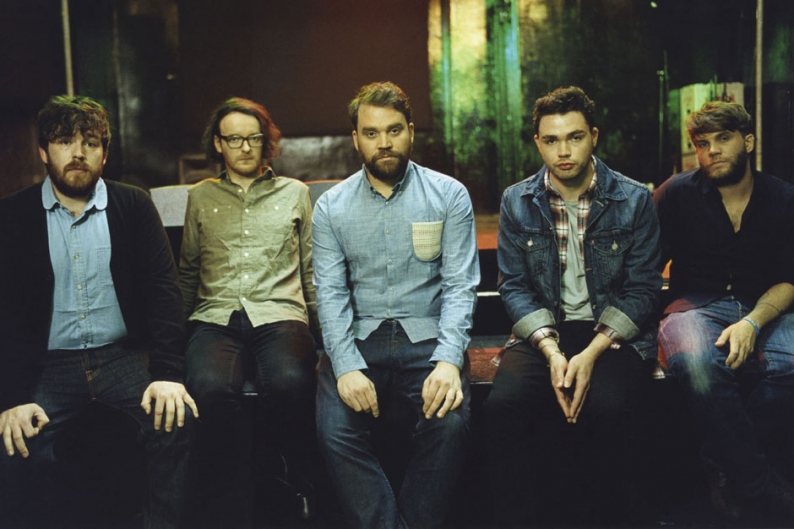Scott Hutchinson named his band, Frightened Rabbit, after a tag he earned as an excruciatingly shy wee lad, but you wouldn’t know it from the Scottish folk outfit’s raucous live shows and bracingly honest lyrics. Hutchinson is also honest with himself. Bored with the same major chords and sad-sack lyrical worldview that he’d been leaning on, the singer-guitarist decided to push himself, hard, for the band’s fourth LP. He even gave the new album, Pedestrian Verse, out February 5 on Atlantic, a name designed to make sure he wouldn’t write, well, pedestrian verse. To aid in that effort he invited the songwriting contributions of his bandmates, swapped the major for the minor key, and hired Leo Abrahams, who lists Brian Eno and David Byrne among his credits, to produce.
Hutchinson spoke with SPIN about feeling more comfortable singing to 3,000 people than making small talk, moving to a major label, and choosing not to censor himself — especially when it comes to Mumford & Sons. The band also shared with us an exclusive on-the-road video.
You’ve said that Frightened Rabbit’s move to Atlantic after three albums on indie labels was creatively liberating. How so?
People who have been into the band for a while think that a move to a major label would change the band or [the label would] try to mold us into something that we were not, or that we’d make this dumb, too-shiny major-label debut. We were ready to fight for what we spent years building, but [Atlantic] never really did that. We had a lot more freedom to write and record the album the way we wanted because of the time and the resources we had.
Elsewhere, you referred to Pedestrian Verse as a “genuine journey of discovery.” What did you discover?
We started writing the music as a band, which has never happened before. We didn’t know if it was going to work out, but I was reaching a brick wall with my own writing, starting to see patterns in the way I was writing, and I wasn’t about to repeat myself by making another version of what we had done before. Also, I had always been intrigued by the combination of major chord joyfulness and miserable lyrics, and I thought the minor key could be oppressive. But I began to enjoy [writing in the minor key], and it was testament to the other guys getting involved that that even happened.
Did having to wait three months for Leo Abrahams to become available before you started recording affect the record?
We were kind of pissed off to begin with, because we thought we were ready to make [Pedestrian Verse]. But after the initial period of disappointment, we went back to rework the songs, and it actually turned out to be a crucial period. “Nitrous Gas” started out with a completely different feel. A lot of the album gallops along full tilt, and that song developed into something quite a bit sadder, quite a bit more morose. It turned out to be one of my favorite songs on the record.
When you said the album “gallops along,” it made me think of Mumford & Sons and the Lumineers, bands which, stylistically at least, have similarity with your own. Do you see yourself as fitting in with them?
Melodically, there are things we have in common with those bands, but I’m not sure we have embraced the entire aesthetic of Mumford & Sons. The things we share are a life-affirming aspect in spite of darker lyrical content, and the music comes alive at shows and stuff, but I hope that the new record pulls us away from that world. It’s a slightly frustrating comparison because I don’t hate those bands but I don’t aspire to be like them in any way.
Personally, I like your new record more than Mumford & Sons’.
That’s good to hear. I was trying to be very diplomatic but I fucking hate that band and don’t want to be associated with them. I thought the first record did something that I appreciated, but with the second they were just shoveling the same shit. And that’s one of the reasons we’re trying to separate ourselves, because it’s a huge insult to someone who’s invested in the band to give them more of the same.
Did you initially start a band to overcome your shyness?
I started as a guitar player in high school bands, and that’s an easy place to hide. But when I started performing after being coerced by various flatmates to get my songs out of my bedroom and into a public arena, I started feeling really comfortable. I feel more comfortable with a microphone addressing 3,000 people than at a party trying to make small talk with someone I don’t know. That still terrifies me.
The band is known for the intense connection it has with its live audiences. Does that have to do with what you just told me, that it’s easier for you to interact with people when you’re fully in control onstage?
It does have a lot to do with that, but it also has a lot to do with the fact that people invest heavily in what I’m singing and what I’m doing in the songs. Seriously, I just wrote the second record in private, and all of a sudden I had an audience, and that was the level of intensity that people came to expect. I became comfortable with that for a while, and with the new record I’m okay with that again. Personal material in the public domain is going to be hurtful to the people in my life, and I became acutely aware of that. But what I decided with this record was that I wasn’t going to censor myself, because I did that with the last album and it lost a lot of appeal. And I promised myself that I wasn’t going to do that this time around.





